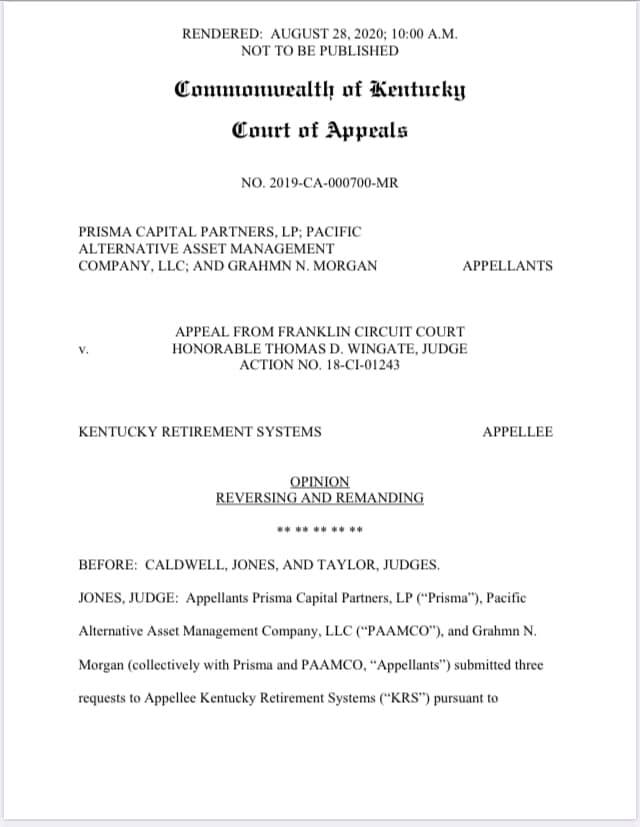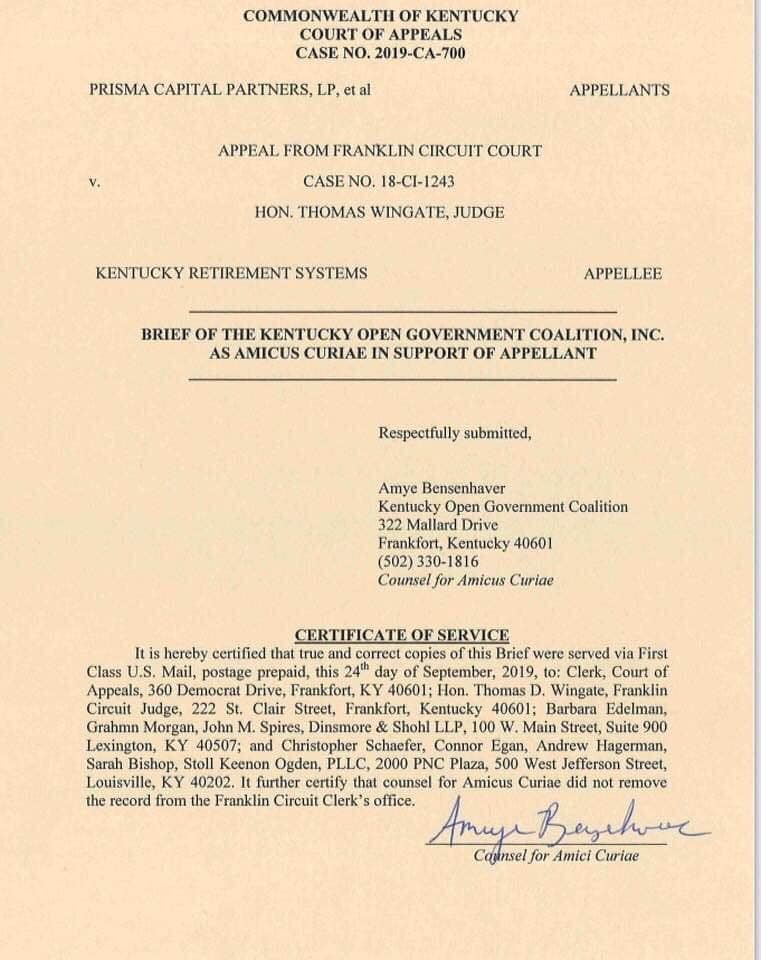

The Kentucky Retirement Systems violated the open records law in denying Prisma Capital Partners' requests for "records related to KRS's decision to endorse litigation claims advanced" in the Mayberry case against Prisma and others.
So says the Kentucky Court of Appeals in an opinion issued on August 28, 2020.
http://opinions.kycourts.net/coa/2019-CA-000700.pdf
The opinion — though unpublished — again confirms that the courts intend to strictly construe some of the most abused exceptions to the open records law and to require public agencies to meet their burden of proving that the denial of a records request was proper.
Prisma is one of several outside advisers and investment managers that, along with current and former KRS trustees and officers, were sued by eight retirement systems members "'on behalf of' KRS" for allegedly inducing KRS to enter into investments that were "unsuitable, underperformed relative to the stock market, and increased KRS's unfunded pension liabilities."
The Mayberry litigation is complex and today's opinion is fact intensive. But the lynchpin on which the court's analysis turns is that at the time the disputed records were produced/exchanged, the Mayberry plaintiffs and the KRS were adversaries.
Only after Prisma submitted the request did KRS and the Mayberry plaintiffs notify the court that KRS "believes that it is in the best interests of KRS for [the Mayberry] plaintiffs to continue their pursuit of these claims on a derivative basis on KRS's behalf."
KRS therefore could not properly treat the requested records as preliminary internal records.
KRS, the Court reasoned, "premised a large portion of its argument on the idea that the withheld documents reflect KRS's internal decision-making process. We fail to see how the records at issue â emails between opposing parties to the Mayberry action and an overview document drafted by the Mayberry plaintiffs' counsel â are internal to KRS. KRS acknowledges that the records were not created by KRS but rather the Mayberry plaintiffs' counsel. Accordingly, the withheld documents cannot be
deemed internal to KRS, and we need not address any issues regarding final action."
Nor could it characterize the records as attorney/client privileged communications or as work product. Because the Mayberry plaintiffs shared the records with KRS before their interests were aligned, they waived the protection afforded by the privileges.("Any privilege was waived when the Mayberry plaintiffs' counsel voluntarily shared the documents with KRS.")
The court expressly rejected the Franklin Circuit Court's determination that the records constituted KRS attorney work product, as well as the court's remarks that the records were "something else" and "I don't know if they're work product, I don't know if they're common interest, but I can understand why perhaps they [KRS] don't want you to see them."
But, once again, because the Mayberry plaintiffs shared the records with KRS before their interests were aligned, they waived the protection afforded by the work product doctrine.
Noting that "no precedent exists to support the position that work product created by one party and turned over to its opponent can be the work product of the adverse party," the court flatly rejected the work product defense.
"It would be incredible to construe this rule in favor of withholding documents exchanged between adversarial parties amidst litigation. Indeed, the work product doctrine was meant to protect parties from being forced to 'hand over the result of his work to an opponent.' The Mayberry plaintiffs named KRS as a nominal defendant, and KRS declined to align with them."
The case marked the first occasion — but, we hope, not last occasion — on which the Kentucky Open Government Coalition filed an amicus ("friend of the court") brief.
https://www.facebook.com/419650175248377/posts/521547695058624/?extid=M…
While it is doubtful that our earnest efforts swayed the outcome in the case, we reminded the court that "as the attorney client privilege and work product doctrine jockey for the lead position in the race to become the most overused exceptions to the Open Records Act, it is imperative that the courts of the Commonwealth strictly construe these exceptions and hold agencies to their statutorily assigned burden of proof as a check against abuse."
Todays opinion contains a lot of useful analysis of previously "unlawed" open records issues, and, of course, we wish it were designated "To Be Published."
But we fully expect KRS to petition the Kentucky Supreme Court for discretionary review, forestalling access to the requested records for several months.



